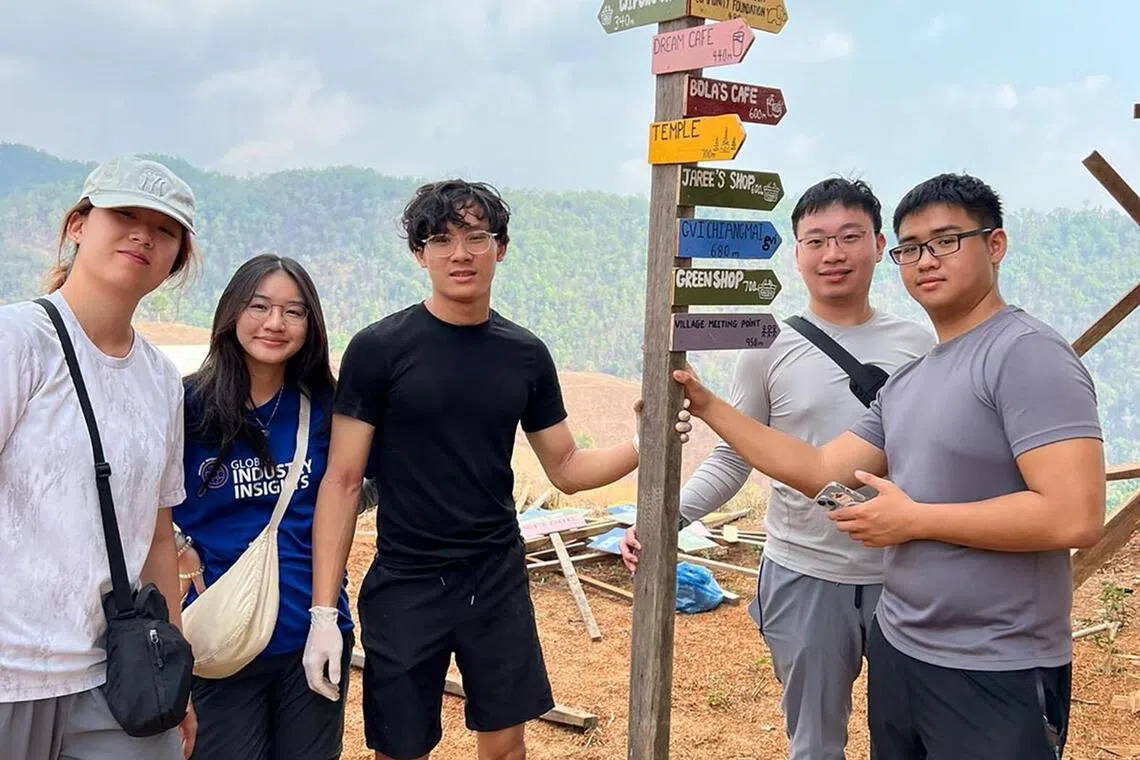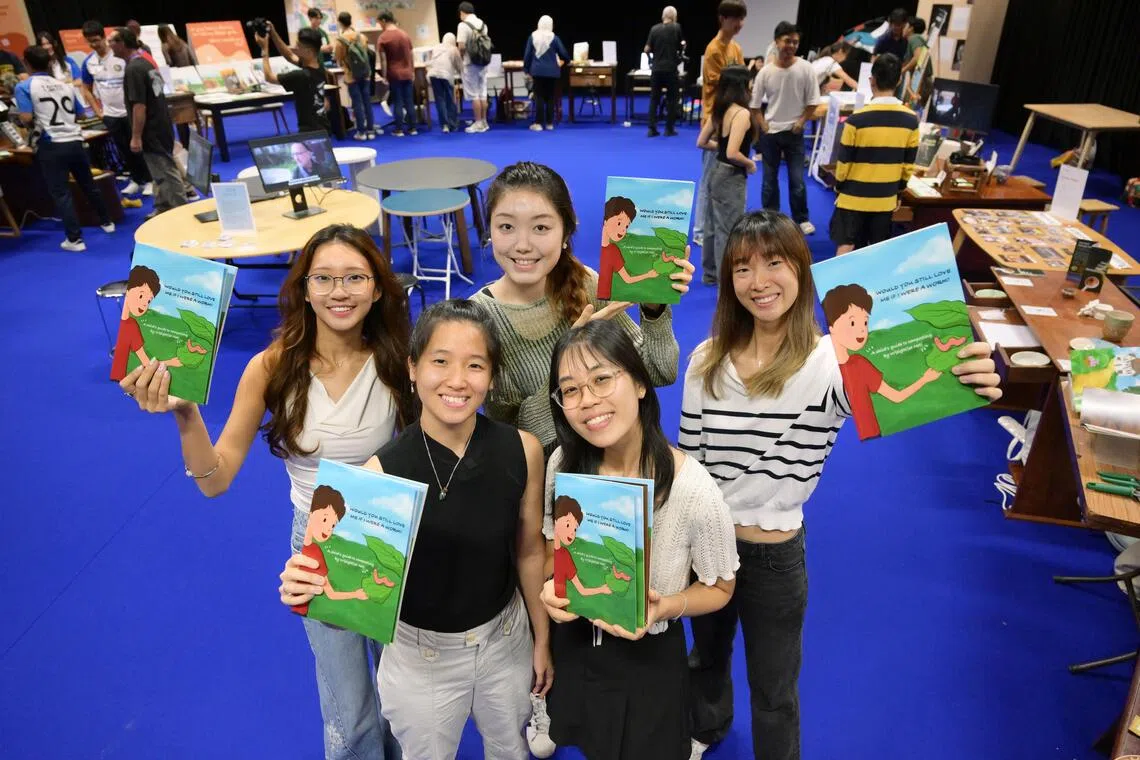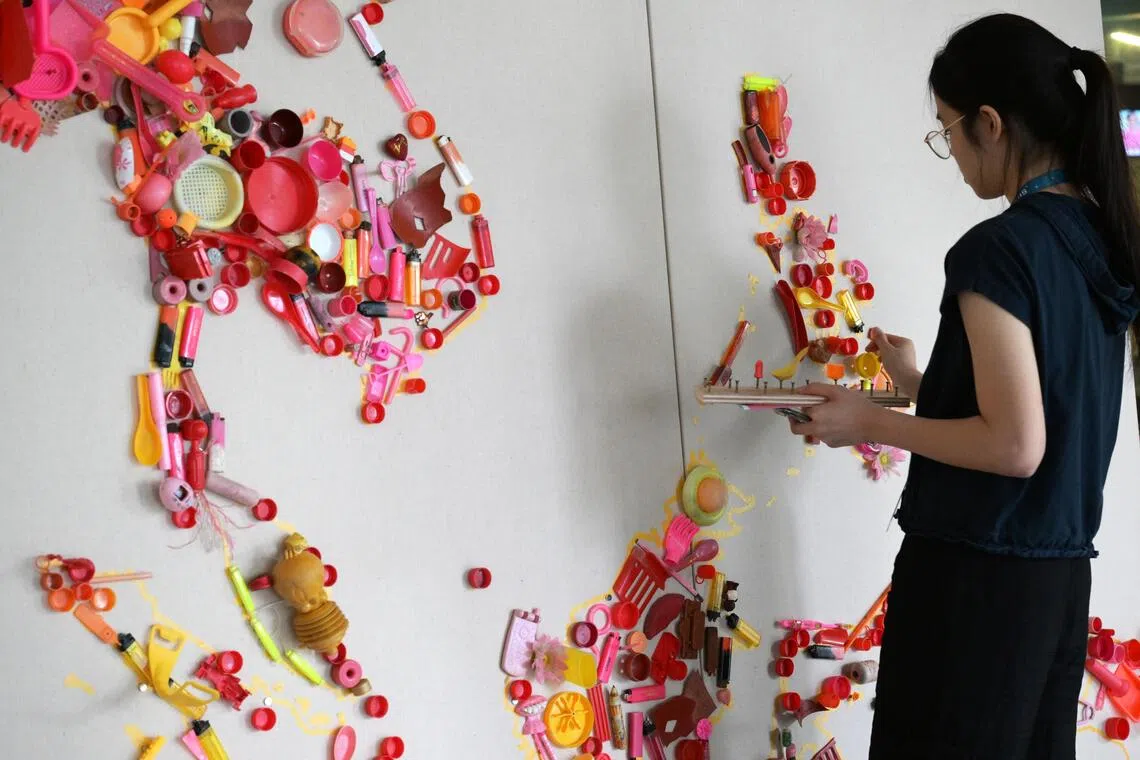NUS College showcases first cohort’s initiatives, including elephant ecotourism in Thailand
Sign up now: Get ST's newsletters delivered to your inbox

NUS College students behind the Elephant in the Room project at the inaugural Impact Festival at NUS University Town on Sept 17. Their initiative aims to improve the elephant ecotourism model at the Karen village of Huay Pakkoot in Thailand.
PHOTO: NG SOR LUAN
Koh Ming Lun
Follow topic:
- NUS College students worked on a project to boost ecotourism in a Thai village (Huay Pakkoot) by installing signs and creating promotional documentaries.
- Students tackled real-world issues via the "Impact Experience" programme, partnering with communities in Southeast Asia.
- Another student group minimised food waste, creating compost from 100kg of hotel scraps with Corridor Farmers.
AI generated
SINGAPORE – Driving through the mountainous regions of northern Thailand, from Chiang Mai towards the national parks beyond the Mae Chaem district, a bright yellow sign stands out among the usual roadside markers.
The sign, that reads “Welcome to the Huay Pakkoot Elephant Community Foundation” in English, was installed by a group of NUS College (NUSC) students in May 2024. It invites travellers to stop by the Karen village of Huay Pakkoot, which is known for its close connections with a community of about 60 elephants.
Before the sign was installed, many travellers were unaware of the village’s location along the route due to its lack of visibility. Home to about 250 villagers, its only entrance for travellers is via a slip road that did not have any accompanying signs.
In a bid to boost ecotourism in the village, the team of seven students also created a short documentary series about the village, which will be featured on the Huay Pakkoot Elephant Community Foundation’s website and used as promotional material.
They also started a wildlife project to track and document sightings of different animal species around the village.
One of the students, Mr Chen Zeyuan, 24, who is studying chemistry and philosophy, said: “The wildlife project functions not only as publicity material but also as an archive of knowledge that would otherwise have been passed on by word of mouth.”
This student-led initiative was one of more than 40 projects showcased on Sept 17 at the inaugural Impact Festival, organised by NUSC and held at NUS University Town.

(From left) NUSC students Ma Xinyue, Adeline Leong Kar Wai, Eugene Luke Sim Ek Jin, Davis Clarence Tey Zhi Yuan and Chee Koi Jun with the directional sign they created to help tourists find their way around Huay Pakkoot.
PHOTO: CHEN ZEYUAN
The projects were carried out by the first cohort of NUSC students as part of its signature Impact Experience (IEx) programme. The compulsory module brings together students from different fields to work with local and regional partners over two years to tackle real-world challenges across Singapore and South-east Asia.
Professor Simon Chesterman, dean of NUSC, said the programme is a distinct feature of the college.
“It’s not just about what our students learn in the classroom, but also how they take that knowledge into the world, work alongside communities and create meaningful change,” he said.
In the first cohort of about 60 teams, around half worked with overseas communities in South-east Asia. This has risen to two-thirds in the third cohort, which has just started its IEx projects, said Associate Professor Daniel PS Goh, vice-dean at NUSC.
“Given the climate and development crises afflicting South-east Asia, the majority of the projects have to do with socio-economic advancement of communities living close to the poverty line or environmental and climate change issues or both – especially when ecological degradation affects already precarious livelihoods,” he said.
For Mr Chen and his six teammates, applying what they learnt in the classroom to the real world took them to Huay Pakkoot five times over the course of two years. There, they interacted with villagers and the Huay Pakkoot Elephant Community Foundation to understand local needs and how they could contribute.
As the village has only two villagers who speak English, the students curated materials such as a field guide and menu in English for the community to use when they interact with tourists.
Mr Satit Trachookwamdee, founder of Huay Pakkoot Elephant Community Foundation, said the students’ initiatives have improved outreach and helped the village communicate better with tourists.
Associate Professor Peter Vail, the project supervisor, said ecotourism boosts tourism for such villages while supporting animal welfare, as elephants that can roam freely around the village live healthier lives than those in elephant camps.
“It helps the village do the ecologically important work of getting people up to the elephants, rather than bringing the elephants down to the people.”
To sustain the impact of the initiatives, Prof Vail hopes to bring another cohort of students to build on the work done by the original team.
“Instead of simply showing up in the village, doing something and disappearing, we hope to have a longer-term presence, to have continuity across the programmes,” he said.

NUSC students (clockwise from far left) Germaine Yew, Zhang Xinyu, Katelyn Choo, Nguyen Ha My and Ashley Lui – together with fellow student Lauryn Foo (not pictured) – turned food waste into compost for community gardens.
ST PHOTO: NG SOR LUAN
Another group decided to take on a local challenge instead – minimising food waste by turning it into compost. As teammates, the six students – whose disciplines range from business analytics to pharmaceutical science – shared an interest in environmental issues such as recycling. This led them to work with agricultural start-up Corridor Farmers, which manages the rooftop garden of Fairmont Singapore.
The students managed to recycle 100kg of food waste generated by the hotel’s kitchen into compost, which was distributed back to Fairmont’s rooftop garden and community gardens belonging to social service agency Minds and Metta Welfare Association.
The team also plans to distribute a children’s book they created to introduce families to composting and encourage sustainable habits at home.
NUSC information systems student Zhang Xinyu, 22, one of the team members, said: “We wanted to make it for children because we want to send the message that anybody can do composting, and we want the impact to last even after we finish the project.”
Visitors to the Impact Festival can also contribute to an art installation by Dr Wang Ruobing, an artist and lecturer at the Lasalle College of the Arts.

The Tides Between installation by Dr Wang Ruobing at the inaugural Impact Festival on Sept 17.
ST PHOTO: NG SOR LUAN
With her installation Tides Between, Dr Wang invites the public to co-create a giant map of South-east Asia using marine debris partly collected by students and lecturers during their IEx programme.
She hopes the installation, which is on display for a week at NUS, will highlight the region’s interconnectedness – with debris from one country affecting another – and encourage people to see everyday objects, even trash, as potential works of art.

